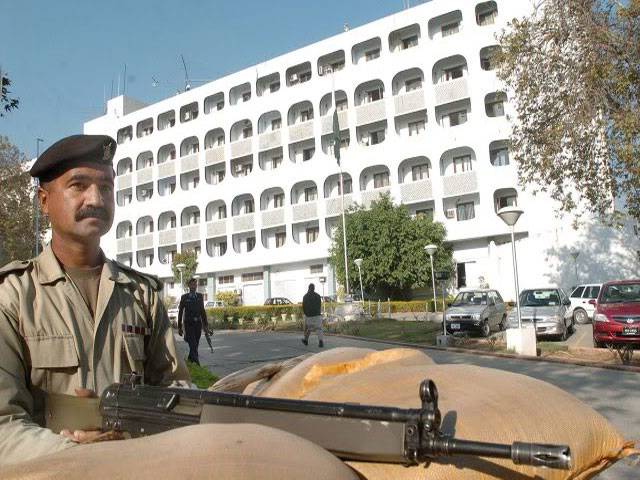ISLAMABAD - Pakistan yesterday said the growing defence ties between the United States and India could trigger an arms race in the region amid tensions between Islamabad and New Delhi.
Foreign Office spokesman Nafees Zakariya expressed concerns over US- India defence agreement and said the pact will not be helpful for the regional peace.
This week India signed the Logistics Exchange Memorandum of Agreement with the US which will allow their militaries to work closely and use each other’s bases for repair and replenishment of supplies.
The LEMOA, which sets a precedent for other future military pacts between the two countries, was signed in Washington between Defence Minister Manohar Parrikar and US counterpart Ashton Carter to facilitate opportunities for “practical engagement and exchange.”
The announcement of the pact drew sharp criticism at home from the Congress which called it a “fundamental departure” from India’s time-tested policy of “strategic military neutrality.”
The logistics agreement between the two countries was first proposed in 2003 but India did not agree to its signing until earlier this year.
The LEMOA, a version of the standard US Logistics Support Agreement tailored for India, “establishes basic terms, conditions, and procedures for reciprocal provision of logistic support, supplies, and services between the armed forces of India and the United States.”
The only similar case of an Indian agreement with a major power was the Indo-Soviet Treaty of Peace, Friendship and Cooperation in August 1971 just ahead of the Pak-India war.
But even that agreement was strategic in nature, with little cooperation at the level of the two militaries. The LEMOA, in contrast, allows Indian and American militaries to operate closely by using each other’s bases for logistics support.
And as the two countries drew closer, the US pressed Pakistan to engage in talks with India on New Delhi’s terms. Washington has also been passive on Kashmir but has been casting doubts on Pakistan’s role in the anti-terror war.
Encouraged by the US support, New Delhi rejected Islamabad’s invitation to hold talks on the future of Jammu and Kashmir thrice in the recent weeks - claiming it was an integral part of the country.
At his weekly news briefing here, Nafees Zakariya said Pakistan will like to see that such arrangements between the US and India does not contribute to polarizing the region by disturbing the strategic balance and escalating the arms build-up in the region.
Regarding US Secretary of State John Kerry’s statement on Pakistan’s anti-terror efforts, the spokesman said Pakistan drew no distinction in the terrorist groups.
He said the menace of terrorism was not specific to one country rather it is an international phenomenon and collective efforts are required to root it out.
The spokesman said Pakistan was mindful of the elements working against the interests of Pakistan in the US. He however, said: “We engage with all the countries including the US in order to protect the country s national interests.”
Zakariya said with the US, “we have a comprehensive mechanism and at bilateral meetings all matters of mutual concerns are discussed.”
He said Prime Minister Nawaz Sharif had written another letter to the UN Secretary General Ban Ki-Moon apprising him of the deteriorating situation and human rights violations in Kashmir.
“The PM welcomed the UN Secretary General’s call for making efforts to avoid further violence and thanked him for recognizing Pakistan’s commitment to the peaceful resolution of Kashmir dispute,” he said.
In his letter, the PM mentioned that while the Azad Jammu Kashmir cannot be compared in terms of the grim and tragic situation of human rights in held Kashmir, it remained “open to any UN mission for a visit as it has always facilitated the UNMOGIP, foreign diplomats and tourists.”
The letter, Zakariya said, called Indian PM Narendra Modi’s remarks on Balochistan as unwarranted and in complete contravention of the UN charter.
It said the remarks were designed to divert the world attention from the ongoing atrocities in the held valley.
The prime minister, while welcoming the UN Secretary General’s offer for use of his good offices, said that Kashmir was the main dispute between Pakistan and India.
The foreign office spokesman said Pakistan will continue its efforts to raise the Kashmir dispute at the international level.
“It will figure prominently at the upcoming annual meetings of the United Nations General Assembly and the OIC (Organisation of Islamic Cooperation) on the sidelines of the UN session,” he said.
Zakariya said that the Indian brutalities had not only been condemned by the international community but also members of different segments of the society within India. He said the Indian government should listen to those voices and end the bloodshed in the valley.
The spokesman said Pakistan wanted peaceful resolution of the lingering Kashmir dispute through the dialogue process, for which the country was always ready. He, however, said any preconditions to the talks “will not be accepted.”
Questioned about the trilateral setup formed by the US, India and Afghanistan, he said Pakistan was not sure what was the need of this platform.
As for peace in Afghanistan, he said, Pakistan remained committed to an Afghan-owned and Afghan-led peace process such as the Quadrilateral Coordination Group.
He said Pakistan and Afghanistan had agreed to hold coordination meetings every month on the border issues. “The two sides have agreed to respect each other’s flags, documents and leaders. Visas and passport issues will also be discussed between the two countries,” he said.






